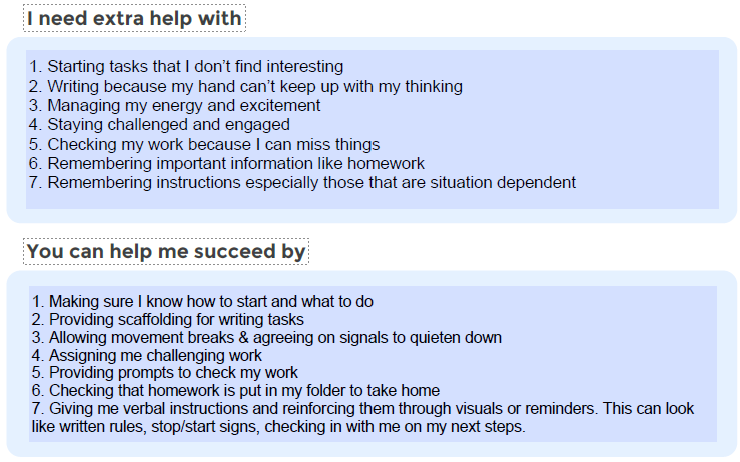New year and new teacher, but the same underlying executive functioning issues
“Teacher X has a short fuse and doesn’t understand ADHD” Two full weeks of school and this is the first impression of the teacher my kid shared with me. Without jumping to conclusions I asked “Why do you say that?”. I always take historical recounting by my child with a pinch of salt, but they told me a story that illustrated how his working memory issues often gets him into trouble.
The story my kid told me is a common scenario: a student is instructed by a teacher not to do Y, but a short time later they notice that another peer is doing Y, by this point the student has forgotten the teacher’s original verbal instruction and does it anyway. On the surface this looks like purposeful behaviour, and no doubt in some situations it can be, but I can also see that a weak working memory contributed to the outcome.
How working memory works: the post-it note analogy
Working memory serves as a set of post-it notes where you keep important details to help you make decisions about the future, and it is constantly being accessed depending on the task you are doing. The problem with working memory is that it is a limited resource.
The ADHD working memory post-it pad is not as big and the notes are not as sticky as those of a neurotypical brain. To make the most of working memory we also have to be really good at focusing on a task and disregarding all the interesting things that happen around us (impulse control). When you are paying attention it is easier to prioritise the information you need to retrieve from working memory to make decisions.
What does this have to do with my kids’ story? Let me step you through the example he gave and point out how working memory and attention regulation were at the heart of his infringement.
It’s Tuesday morning and there is excitement in the classroom and chatting between students about the story they are writing. My kid walks past a set of cubes and starts rearranging them, and the teacher gives him the following verbal instructions “No playing with the cubes. You need to finish writing your story.”. My kid’s brain takes those instructions and puts them on a working memory post-it note and goes back to writing his story.
In the meantime, the working memory post-it notes start to fill up with other information to help him complete the story. A friend asks him a question and his working memory uses another post-it note to store the question. My kid then realises that he needs to sharpen his pencil, so he gets up and focuses his attention on finding a sharpener. His working memory adds that task and necessary details to another post-it note.
If you look at all his working memory post-it notes you can see that they are all full with things he has to remember. At this stage, the original post-it note with the teacher’s instructions has either fallen off or it’s buried under all the latest post-it notes.
When my kid gets up to find a sharpener he notices another student playing with cubes. By now his working memory is no longer able to retrieve the post-it note that said “Don’t play with the cubes.” to make a decision on what to do next. Instead, it uses the recent visual image as a cue that it’s ok to play with the cubes.
What happens next is a result of a cranky teacher dealing with a student who has specifically disobeyed instructions. I get it, why can’t these kids do as they are told?
The teacher has every right to get cranky, because if all students do whatever they want, then they can’t teach the class. It is what the teacher does next and how they go about future interactions that can make a difference to the “understanding ADHD”.
This is just one example of how a working memory with limited and not very sticky post-it notes gets in the way of kids meeting expectations.
What advocating looks like
I have no doubt that similar situations will continue to pop up, so my job is to help the teacher understand the different aspects of executive functioning and give them ideas on how to support it.
I’m updating my kid’s About Me profile with the following:
Our parent and teacher interview is coming up next week and I’ll be taking the teacher through the Supporting Students with ADHD booklet, and more specifically my child’s About Me profile. I’ll report back!
If your teacher’s child could do with extra information about your child and strategies to help them grab the free About Me template download and fill it out.



